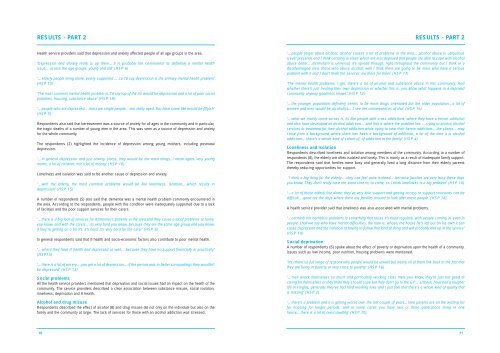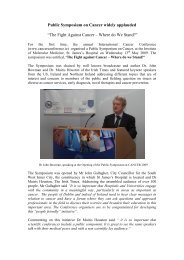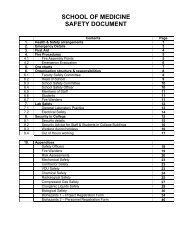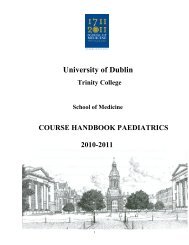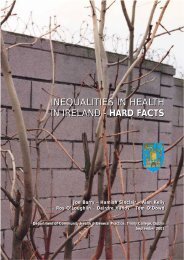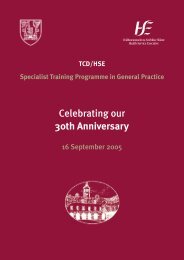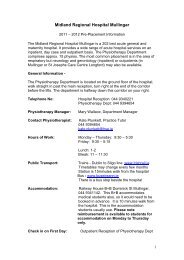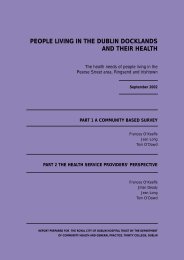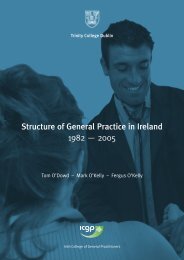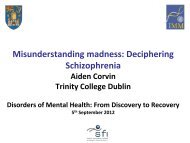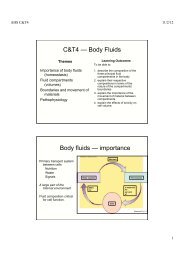people living in finglas and their health - School of Medicine - Trinity ...
people living in finglas and their health - School of Medicine - Trinity ...
people living in finglas and their health - School of Medicine - Trinity ...
Create successful ePaper yourself
Turn your PDF publications into a flip-book with our unique Google optimized e-Paper software.
RESULTS - PART 2<br />
RESULTS - PART 2<br />
Health service providers said that depression <strong>and</strong> anxiety affected <strong>people</strong> <strong>of</strong> all age groups <strong>in</strong> the area.<br />
‘Depression <strong>and</strong> anxiety really is up there….it is probably the commonest its def<strong>in</strong>itely a mental <strong>health</strong><br />
issue….across the age groups, young <strong>and</strong> old’ (HSP 6)<br />
‘…elderly <strong>people</strong> <strong>liv<strong>in</strong>g</strong> alone, poorly supported ….so I’d say depression is the primary mental <strong>health</strong> problem’<br />
(HSP 13)<br />
‘The most common mental <strong>health</strong> problem is, I’d say top <strong>of</strong> the list would be depression <strong>and</strong> a lot <strong>of</strong> poor social<br />
problems, hous<strong>in</strong>g, substance abuse’ (HSP 19).<br />
‘…<strong>people</strong> who are depressed….most are s<strong>in</strong>gle <strong>people</strong>….not really aged. You have some like would be fiftyish’<br />
(HSP 5)<br />
Respondents also said that bereavement was a source <strong>of</strong> anxiety for all ages <strong>in</strong> the community <strong>and</strong> <strong>in</strong> particular,<br />
the tragic deaths <strong>of</strong> a number <strong>of</strong> young men <strong>in</strong> the area. This was seen as a source <strong>of</strong> depression <strong>and</strong> anxiety<br />
for the whole community.<br />
The respondents (2) highlighted the <strong>in</strong>cidence <strong>of</strong> depression among young mothers, <strong>in</strong>clud<strong>in</strong>g postnatal<br />
depression.<br />
‘…<strong>in</strong> general depression <strong>and</strong> just anxiety, stress, they would be the ma<strong>in</strong> th<strong>in</strong>gs, I mean aga<strong>in</strong>, very young<br />
mums, a lot <strong>of</strong> children, not a lot <strong>of</strong> money’ (HSP 16)<br />
Lonel<strong>in</strong>ess <strong>and</strong> isolation was said to be another cause <strong>of</strong> depression <strong>and</strong> anxiety.<br />
‘…with the elderly, the most common problems would be like lonel<strong>in</strong>ess, isolation….which results <strong>in</strong><br />
depression’ (HSP 15)<br />
A number <strong>of</strong> respondents (5) also said that dementia was a mental <strong>health</strong> problem commonly encountered <strong>in</strong><br />
the area. Accord<strong>in</strong>g to the respondents, <strong>people</strong> with this condition were <strong>in</strong>adequately supported due to a lack<br />
<strong>of</strong> facilities <strong>and</strong> the poor support services for <strong>their</strong> carers.<br />
‘…there is a big lack <strong>of</strong> services for Alzheimer’s patients <strong>in</strong> the area <strong>and</strong> they cause a lot <strong>of</strong> problems at home,<br />
you know, <strong>and</strong> with the carers….its very hard you know, because they are the same age group <strong>and</strong> you know,<br />
if they’re gett<strong>in</strong>g on a bit it’s, it’s hard, It’s very hard for the carer’ (HSP 9)<br />
In general respondents said that ill <strong>health</strong> <strong>and</strong> socio-economic factors also contribute to poor mental <strong>health</strong>.<br />
‘…where they have ill <strong>health</strong> <strong>and</strong> depressed as well….because they have no support f<strong>in</strong>ancially or practically’<br />
(HSP15)<br />
‘…there is a lot <strong>of</strong> misery….you get a lot <strong>of</strong> depression….if the person was <strong>in</strong> better surround<strong>in</strong>gs they wouldn’t<br />
be depressed’ (HSP 13)<br />
Social problems<br />
All the <strong>health</strong> service providers mentioned that deprivation <strong>and</strong> social issues had an impact on the <strong>health</strong> <strong>of</strong> the<br />
community. The service providers described a clear association between substance misuse, social isolation,<br />
lonel<strong>in</strong>ess, deprivation <strong>and</strong> ill <strong>health</strong>.<br />
Alcohol <strong>and</strong> drug misuse<br />
Respondents described the effect <strong>of</strong> alcohol (8) <strong>and</strong> drug misuse (6) not only on the <strong>in</strong>dividual but also on the<br />
family <strong>and</strong> the community at large. The lack <strong>of</strong> services for those with an alcohol addiction was stressed.<br />
‘…<strong>people</strong> forget about alcohol, alcohol causes a lot <strong>of</strong> problems <strong>in</strong> the area….alcohol abuse is ubiquitous<br />
((ever present)) <strong>and</strong> I th<strong>in</strong>k certa<strong>in</strong>ly <strong>in</strong> areas which are less deprived that <strong>people</strong> are able to cope with alcohol<br />
abuse better….alcoholism is universal, it’s spread through, right throughout the community but I th<strong>in</strong>k <strong>in</strong> a<br />
disadvantaged area, those who abuse alcohol, well I th<strong>in</strong>k there are go<strong>in</strong>g to be more who have a serious<br />
problem with it <strong>and</strong> I don’t th<strong>in</strong>k the services are there for them’ (HSP 17)<br />
‘The mental <strong>health</strong> problems, I get, there’s a lot <strong>of</strong> alcohol <strong>and</strong> substance abuse <strong>in</strong> this community. And<br />
whether there’s just treat<strong>in</strong>g <strong>their</strong> own depression or whether this is, you know what happens <strong>in</strong> a deprived<br />
community anyway goodness knows’ (HSP 12)<br />
‘…the younger population def<strong>in</strong>itely seems to be more drugs orientated but the older population…a lot <strong>of</strong><br />
women <strong>and</strong> men would be alcoholics….I see the consequences <strong>of</strong> that’ (HSP 16)<br />
‘…what we ma<strong>in</strong>ly come across is, its like <strong>people</strong> with cross addictions, where they have a hero<strong>in</strong> addiction<br />
<strong>and</strong> also have developed an alcohol addiction….<strong>and</strong> that is where the problem lies ….try<strong>in</strong>g to access alcohol<br />
services or treatment for <strong>their</strong> alcohol addiction while try<strong>in</strong>g to treat <strong>their</strong> hero<strong>in</strong> addiction….the clients….may<br />
come from a background where there has been a background <strong>of</strong> addiction, a lot <strong>of</strong> the time it is alcohol<br />
addiction….there’s a whole k<strong>in</strong>d <strong>of</strong> cohort <strong>of</strong>, <strong>of</strong> addiction <strong>in</strong> the family’ (HSP 4)<br />
Lonel<strong>in</strong>ess <strong>and</strong> isolation<br />
Respondents described lonel<strong>in</strong>ess <strong>and</strong> isolation among members <strong>of</strong> the community. Accord<strong>in</strong>g to a number <strong>of</strong><br />
respondents (8), the elderly are <strong>of</strong>ten isolated <strong>and</strong> lonely. This is ma<strong>in</strong>ly as a result <strong>of</strong> <strong>in</strong>adequate family support.<br />
The respondents said that families were busy <strong>and</strong> generally lived a long distance from <strong>their</strong> elderly parents<br />
thereby reduc<strong>in</strong>g opportunities for support.<br />
‘I th<strong>in</strong>k a big th<strong>in</strong>g for the elderly….they can feel quite isolated….because families are very busy these days<br />
you know. They don’t really have the same time to, to come, so I th<strong>in</strong>k lonel<strong>in</strong>ess is a big problem’ (HSP 10)<br />
‘…a lot <strong>of</strong> those elderly live alone, they’ve very little support <strong>and</strong> gett<strong>in</strong>g access to support structures can be<br />
difficult….gone are the days where there are families around to look after these <strong>people</strong>’ (HSP 18)<br />
A <strong>health</strong> service provider said that lonel<strong>in</strong>ess was also associated with marital problems.<br />
‘…certa<strong>in</strong>ly the homeless problems is someth<strong>in</strong>g that raises it's head regularly, with <strong>people</strong> com<strong>in</strong>g <strong>in</strong>, even <strong>in</strong><br />
<strong>people</strong>, shall we say who have marital difficulties, the man is, whose, the house he's left out on his own it can<br />
cause depression <strong>and</strong> the isolation <strong>of</strong> hav<strong>in</strong>g to follow that k<strong>in</strong>d <strong>of</strong> th<strong>in</strong>g <strong>and</strong> will probably end up <strong>in</strong> the service’<br />
(HSP 19)<br />
Social deprivation<br />
A number <strong>of</strong> respondents (6) spoke about the effect <strong>of</strong> poverty or deprivation upon the <strong>health</strong> <strong>of</strong> a community.<br />
Issues such as low <strong>in</strong>come, poor nutrition, hous<strong>in</strong>g problems were mentioned.<br />
‘It’s (there is) full range <strong>of</strong> reasons why <strong>people</strong> would be unwell but nearly all <strong>of</strong> them l<strong>in</strong>k back to the fact that<br />
they are <strong>liv<strong>in</strong>g</strong> <strong>in</strong> poverty or very close to poverty’ (HSP 16)<br />
‘…men wreck themselves so much <strong>and</strong> particularly work<strong>in</strong>g class men, you know, they’re just not good at<br />
car<strong>in</strong>g for themselves or they th<strong>in</strong>k they should cope but they don’t go to the GP….((they)) have had a tougher<br />
life <strong>in</strong> F<strong>in</strong>glas, generally, they’ve had hard work<strong>in</strong>g lives <strong>and</strong> I just feel that there’s a whole k<strong>in</strong>d <strong>of</strong> quality that<br />
is miss<strong>in</strong>g’ (HSP 2)<br />
‘…there’s a problem <strong>and</strong> it is gett<strong>in</strong>g worse over the last couple <strong>of</strong> years…lone parents are on the wait<strong>in</strong>g list<br />
for hous<strong>in</strong>g for longer periods, <strong>and</strong> <strong>in</strong> some cases you have two or three generations <strong>liv<strong>in</strong>g</strong> <strong>in</strong> one<br />
house…there is a lot <strong>of</strong> overcrowd<strong>in</strong>g’ (HSP 10)<br />
70<br />
71


